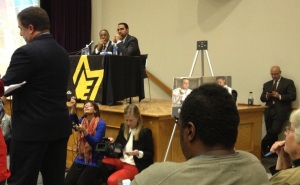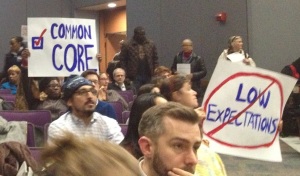NYSED Commissioner John King and Board of Regents Chancellor Merryl Tisch brought their Common Core “listening” tour to New York City last night. Tisch was stationed in the Bronx while John King attended the Brooklyn forum at Medgar Evers College. Tonight (12/11/13) the two will appear together at Spruce Street School/P.S. 397 (12 Spruce Street) in Manhattan from 5-7 pm.
Unlike previous Common Core forums held in New York State, the Brooklyn forum was dominated by Common Core supporters, namely representatives of Michelle Rhee’s StudentsFirst movement, including teachers, and members of Families for Excellent Schools. Former CNN correspondent Campbell Brown, whose husband, Dan Senor, is a board member of StudentsFirstNY, was there as well. What was most striking to me was hearing parents praise high-stakes testing.
Specials interests descend on Brooklyn’s Common Core forum
I arrived at the Medgar Evers auditorium shortly after 4:30 pm. I wanted to get there early to get a speaking slot and to edit and practice my speech. In fact, I was the first speaker to sign up. While I was working in a different location, the Common Core supporters showed up en masse and secured the remaining 44 speaking slots. Even though a significant number of Common Core and high-stakes standardized testing critics were in the audience, I ended up being the only critic who spoke.
Here is a copy of my speech, which I had to deliver in two minutes.
The Common Core is undemocratic and has been implemented in top-down fashion. The Common Core puts corporations, not children, first. It was written secretively by 60 individuals representing a variety of non-profits funded by the Gates Foundation. Only one participant in the entire writing process was a teacher. Not only has the Gates Foundation spent nearly $200 million on the Common Core, but it sent consultants to Washington, DC to help Arne Duncan draft Race to the Top legislation. Here In New York, the Regents Research Fund, which supports the controversial Regents Fellows think tank, received $3.3 million from the Gates Foundation.
Furthermore, teachers did not play a decision-making role in reviewing the standards. A Florida teacher recently said the following about the process:
“As the review unfolded, it became apparent that we were not working with a holistic, integrated application of standards… It began to look instead like a checklist forming a platform for standardized testing” (Florida Teacher: “I Was Among Those Who Reviewed the Common Core in 2009” by Anthony Cody, 11/6/13)
As you’ve “heard” again and again, the Common Core has led to scripted curricula that do little more than prepare students – beginning in kindergarten – for high-stakes Common Core standardized tests. The content, format, and length of the exams, combined with instructional and enrichment time lost to test prep, constitute child abuse and deprive students of a meaningful education.
Do the right thing. End high-stakes testing. Look at model schools – like Mission Hill in Boston – that have experienced great success in teaching the whole child and in using authentic, portfolio-based assessments. Invest in smaller class sizes, especially in Title I schools like mine that have a high number of English-language learners and students with disabilities. We need educated teaching assistants, not an influx of technology, in our overcrowded classrooms. We need autonomy and the freedom to use the standards as we see fit, to best meet the needs of our diverse learners. The Common Core, in my professional opinion, will NOT close the achievement gap.



